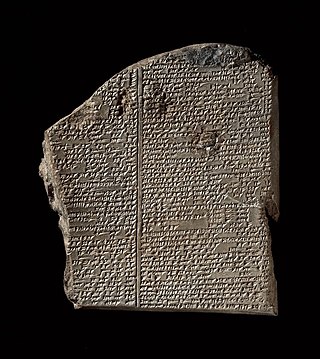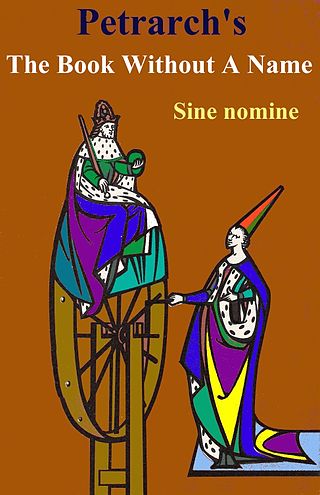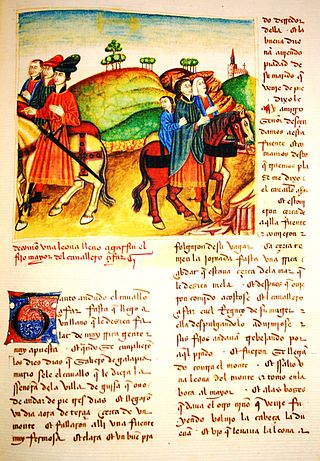
Quintus Ennius was a writer and poet who lived during the Roman Republic. He is often considered the father of Roman poetry. He was born in the small town of Rudiae, located near modern Lecce, a town founded by the Messapians, and could speak Greek as well as Latin and Oscan. Although only fragments of his works survive, his influence in Latin literature was significant, particularly in his use of Greek literary models.

Giovanni Boccaccio was an Italian writer, poet, correspondent of Petrarch, and an important Renaissance humanist. Born in the town of Certaldo, he became so well known as a writer that he was sometimes simply known as "the Certaldese" and one of the most important figures in the European literary panorama of the fourteenth century. Some scholars define him as the greatest European prose writer of his time, a versatile writer who amalgamated different literary trends and genres, making them converge in original works, thanks to a creative activity exercised under the banner of experimentalism.

Francis Petrarch, born Francesco di Petracco, was a scholar from Arezzo and poet of the early Italian Renaissance and one of the earliest humanists.

The Metamorphoses is a Latin narrative poem from 8 CE by the Roman poet Ovid. It is considered his magnum opus. The poem chronicles the history of the world from its creation to the deification of Julius Caesar in a mythico-historical framework comprising over 250 myths, 15 books, and 11,995 lines.

The Homeric Hymns are a collection of thirty-three ancient Greek hymns and one epigram. The hymns praise deities of the Greek pantheon and retell mythological stories, often involving a deity's birth, their acceptance among the gods on Mount Olympus, or the establishment of their cult. In antiquity, the hymns were generally, though not universally, attributed to the poet Homer: modern scholarship has established that most date to the seventh and sixth centuries BCE, though some are more recent and the latest, the Hymn to Ares, may have been composed as late as the fifth century CE.

Tiberius Catius Asconius Silius Italicus was a Roman senator, orator and epic poet of the Silver Age of Latin literature. His only surviving work is the 17-book Punica, an epic poem about the Second Punic War and the longest surviving poem in Classical Latin at over 12,000 lines.

Sophonisba was a Carthaginian noblewoman who lived during the Second Punic War, and the daughter of Hasdrubal Gisco. She held influence over the Numidian political landscape, convincing king Syphax to change sides during the war, and later, in an act that became legendary, she poisoned herself rather than be humiliated in a Roman triumph.

Secretum is a trilogy of dialogues in Latin written by Petrarch sometime from 1342 to 1353, in which he examines his faith with the help of Saint Augustine, and "in the presence of The Lady Truth". Secretum was not circulated until some time after Petrarch's death, and was probably meant to be a means of self-examination during "the crisis of his middle years" more than a work to be published and read by others.

Italian literature is written in the Italian language, particularly within Italy. It may also refer to literature written by Italians or in other languages spoken in Italy, often languages that are closely related to modern Italian, including regional varieties and vernacular dialects.

Cino da Pistoia was an Italian jurist and poet. He was the university teacher of Bartolus de Saxoferrato and a friend and intellectual influence on Dante Alighieri.

Poetry as an oral art form likely predates written text. The earliest poetry is believed to have been recited or sung, employed as a way of remembering oral history, genealogy, and law. Poetry is often closely related to musical traditions, and the earliest poetry exists in the form of hymns, and other types of song such as chants. As such, poetry is often a verbal art. Many of the poems surviving from the ancient world are recorded prayers, or stories about religious subject matter, but they also include historical accounts, instructions for everyday activities, love songs, and fiction.

Il Canzoniere, also known as the Rime Sparse, but originally titled Rerum vulgarium fragmenta, is a collection of poems by the Italian humanist, poet, and writer Petrarch.

De viris illustribus is an unfinished collection of biographies, written in Latin, by the 14th-century Italian author Francesco Petrarca. These biographies are a set of Lives similar in idea to Plutarch's Parallel Lives. The works were unfinished. However he was famous enough for these and other works to receive two invitations to be crowned poet laureate. He received these invitations on exactly the same day, April 8, 1341, one being from the Paris University and the other from the Roman Senate. He accepted the Roman invitation.
Pier Paolo Vergerio was an Italian humanist, statesman, pedagogist and canon lawyer.

The sonnets of Petrarch and Shakespeare represent, in the history of this major poetic form, the two most significant developments in terms of technical consolidation—by renovating the inherited material—and artistic expressiveness—by covering a wide range of subjects in an equally wide range of tones. Both writers cemented the sonnet's enduring appeal by demonstrating its flexibility and lyrical potency through the exceptional quality of their poems.

Epistolae familiares is the title of a collection of letters of Petrarch which he edited during his lifetime. He originally called the collection Epistolarum mearum ad diversos liber but this was later shortened to the current title.

The Liber sine nomine is a collection of nineteen personal letters written in Latin by the fourteenth century Italian poet and Renaissance humanist Petrarch. The letters being harshly critical of the Avignon papacy, they were withheld from the larger collection of his Epistolae familiares and assembled in a separate book. In this fashion, Petrarch reasoned, a reader could throw away this collection, and the other letters to friends could be preserved for posterity.

The Italian poet Petrarch wrote about his ascent of Mont Ventoux on 26 April 1336 in a well-known letter published as one of his Epistolae familiares. In this letter, written around 1350, Petrarch claimed to be the first person since antiquity to have climbed a mountain for the view. Although the historical accuracy of his account has been questioned by modern scholars, it is often cited in discussions of the new spirit of the Renaissance.

Medieval Spanish literature consists of the corpus of literary works written in Old Spanish between the beginning of the 13th and the end of the 15th century. Traditionally, the first and last works of this period are taken to be respectively the Cantar de mio Cid, an epic poem whose manuscript dates from 1207, and La Celestina (1499), a work commonly described as transitional between the Middle Ages and the Renaissance.

Triumphs is a 14th-century Italian series of poems, written by Petrarch in the Tuscan language. The poem evokes the Roman ceremony of triumph, where victorious generals and their armies were led in procession by the captives and spoils they had taken in war. This was a popular and influential poem series when it was published.



















